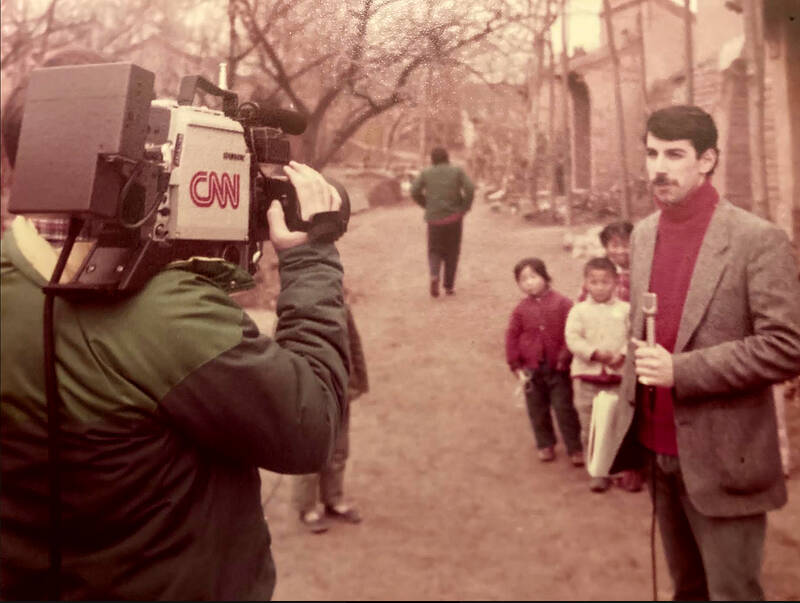Former CNN news anchor Mike Chinoy will screen his recent documentary, Assignment China: Tiananmen Square, next Thursday evening at Taipei’s American Club. The documentary examines news coverage of Tiananmen, which, according to Chinoy, “redefined the relationship between the press, public opinion and foreign policy making, and continues to influence both Chinese politics and international perceptions of China to this day.”
The film is part of a 12-part documentary series, Assignment China, begun in 2008 in association with the University of Southern California’s US-China Institute, where Chinoy is a senior non-resident fellow.
This film series covers more than eight decades of China reporting, beginning with the episode “The Chinese Civil War” on coverage of China in the 1940s, and concluding with “Follow the Money,” about the vast fortunes accumulated by families of Chinese leader Xi Jinping (習近平) and other Chinese political elites, which was brought to light by US reporters in the 2010s. Every major China story to break in the US is covered in between, and all episodes are available on YouTube.

Photo courtesy of Mike Chinoy
Chinoy’s recent book, Assignment China: An Oral History of American Journalists in the People’s Republic, just released in March, came as an outgrowth of the documentary project. (See the book review on p14.)
In the introduction, Chinoy writes that the volume includes “many fascinating comments and stories… left on the cutting room floor” as well as nearly two dozen additional interviews. The book’s historical scope extends beyond that of the film and all the way to 2021, including the COVID-19 pandemic and recent journalist expulsions by China.
Chinoy, who began covering China in 1976 and has spent 24 years as CNN’s top Asia correspondent, is currently based in Taipei.
Following next week’s screening, Chinoy will hold a Q&A and a book signing. To attend, the American Club requests RSVPs by the end of the day tomorrow.

This is the year that the demographic crisis will begin to impact people’s lives. This will create pressures on treatment and hiring of foreigners. Regardless of whatever technological breakthroughs happen, the real value will come from digesting and productively applying existing technologies in new and creative ways. INTRODUCING BASIC SERVICES BREAKDOWNS At some point soon, we will begin to witness a breakdown in basic services. Initially, it will be limited and sporadic, but the frequency and newsworthiness of the incidents will only continue to accelerate dramatically in the coming years. Here in central Taiwan, many basic services are severely understaffed, and

Jan. 5 to Jan. 11 Of the more than 3,000km of sugar railway that once criss-crossed central and southern Taiwan, just 16.1km remain in operation today. By the time Dafydd Fell began photographing the network in earnest in 1994, it was already well past its heyday. The system had been significantly cut back, leaving behind abandoned stations, rusting rolling stock and crumbling facilities. This reduction continued during the five years of his documentation, adding urgency to his task. As passenger services had already ceased by then, Fell had to wait for the sugarcane harvest season each year, which typically ran from

It is a soulful folk song, filled with feeling and history: A love-stricken young man tells God about his hopes and dreams of happiness. Generations of Uighurs, the Turkic ethnic minority in China’s Xinjiang region, have played it at parties and weddings. But today, if they download it, play it or share it online, they risk ending up in prison. Besh pede, a popular Uighur folk ballad, is among dozens of Uighur-language songs that have been deemed “problematic” by Xinjiang authorities, according to a recording of a meeting held by police and other local officials in the historic city of Kashgar in

It’s a good thing that 2025 is over. Yes, I fully expect we will look back on the year with nostalgia, once we have experienced this year and 2027. Traditionally at New Years much discourse is devoted to discussing what happened the previous year. Let’s have a look at what didn’t happen. Many bad things did not happen. The People’s Republic of China (PRC) did not attack Taiwan. We didn’t have a massive, destructive earthquake or drought. We didn’t have a major human pandemic. No widespread unemployment or other destructive social events. Nothing serious was done about Taiwan’s swelling birth rate catastrophe.